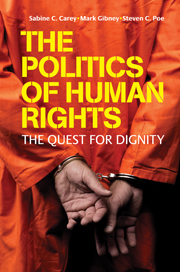Book contents
- Frontmatter
- Contents
- List of text boxes
- List of figures
- List of tables
- List of abbreviations
- Introduction
- Part I Human rights and state responsibilities
- 1 The concept of human rights
- 2 State responsibilities
- 3 Rights with responsibilities
- Part II Empirical representations and explanations of human rights violations
- Part III Intervening and rebuilding in the wake of repression
- Bibliography
- Index
- References
1 - The concept of human rights
Published online by Cambridge University Press: 05 June 2012
- Frontmatter
- Contents
- List of text boxes
- List of figures
- List of tables
- List of abbreviations
- Introduction
- Part I Human rights and state responsibilities
- 1 The concept of human rights
- 2 State responsibilities
- 3 Rights with responsibilities
- Part II Empirical representations and explanations of human rights violations
- Part III Intervening and rebuilding in the wake of repression
- Bibliography
- Index
- References
Summary
We live in revolutionary times. For nearly all of human history, there was no such thing as ‘human rights’. Rather, individuals had whatever ‘rights’ their own government decided to bestow upon them. But what if a state granted few rights – or worse, if it engaged in cruel and barbaric behaviour against its own citizens? Unfortunately, until a relatively short period of time ago, this was viewed as a purely ‘domestic’ or ‘internal’ matter between a government and its own people, and was thus treated as being outside the purview of the rest of the international community.
All this has changed, at least in theory. Certainly, the greatest impetus for the present-day human rights revolution was the Holocaust, when an estimated 6 million Jews were cruelly and systematically killed during the Second World War. Here was undeniable and incontrovertible proof that citizenship might offer absolutely no protection against a government that sought to make war on a particular group of people within a given society. Yet what the horrors of the Holocaust also showed was that this laissez-faire attitude regarding how a government treated its own citizens was simply no longer acceptable. Thus what emerged from what was arguably the darkest period in all human history was the present-day human rights revolution.
What are human rights?
The legal philosopher Michael Perry has summed up the essence of human rights by positing that there are certain things that ought never to be done to people and certain other things that should be done (Perry 1998).
- Type
- Chapter
- Information
- The Politics of Human RightsThe Quest for Dignity, pp. 6 - 39Publisher: Cambridge University PressPrint publication year: 2010

